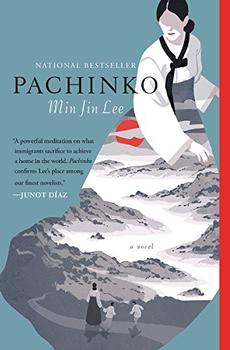Summary | Excerpt | Reading Guide | Reviews | Beyond the book | Read-Alikes | Genres & Themes | Author Bio

Pachinko has one of the best opening lines I've encountered in some time: "History has failed us, but no matter." It's an unexpectedly cynical start to a historical novel, suggesting that every generation has to recreate itself after the letdown of the last one. For this fictional family, the pessimism is partially justified: although the specific challenges vary from one generation to another, being Korean in a foreign country is an ongoing struggle.
The novel opens in 1910, the year Japan annexed Korea, with an almost folktale-like scenario: in Yeongdo district, in the South Korean city of Busan, a fisherman and his wife have four sons, but only Hoonie, who has a cleft palate and clubfoot, survives. Hoonie marries and dies shortly thereafter leaving his 13-year-old daughter Sunja, and her mother, to run the family boardinghouse. During the hard winter of 1932, the sixteen-year-old Sunja becomes pregnant, but refuses to reveal the identity of the father - Koh Hansu. Hansu, a rich Korean businessman who meets Sunja while working in Busan, has a wife and children back in Japan, his adopted country, and so cannot marry Sunja. Instead, one of the boarding house guests, Presbyterian minister Baek Isak, comes to the rescue— he sympathizes with Sunja's predicament and offers to take her to Osaka as his wife.
Japan will be the family base for the next half-century or more, even though Koreans are treated as second-class citizens there. Isak and Sunja move in with his brother and sister-in-law in a squalid ghetto in Osaka. Soon Noa is born and, six years later, Mozasu. Sunja and her sister-in-law start selling homemade kimchi and black sugar candy for extra money. The family's prospects are a mixture of good and horrible: a restaurateur hires Sunja and her sister-in-law and gives them a generous salary, but Isak and his fellow churchmen are arrested for insufficient devotion to the Emperor, who, at that time, was considered divine.
As World War II closes in, the family escapes the coming bombardment of Japan's cities by sheltering on a sweet potato farm out in the countryside. Afterwards, they consider returning to famine-ridden Korea, but a fellow native warns them: "For people like us, home doesn't exist." Mozasu quits school and becomes a foreman at a pachinko parlor (see 'Beyond the Book'), while Noa goes to university in Tokyo.
Although some of the central events of the novel, like World War II and the atomic bomb drop at Nagasaki, are familiar territory for fiction, Lee prioritizes out-of-the-ordinary perspectives: her Korean characters are first the colonized, and then the outsiders trying to thrive in a foreign country despite segregation and persecution. Those who can pass for Japanese have the best chance for success, so Koreans like Noa pretend to be Japanese. Food, language, names, dress, and manners all take on extra significance in this context: you can tell whether the characters are proud or ashamed of their Korean origins by what they let others see. Will they take on new names and try to get rid of their accent? Or will they proudly eat kimchi and talk about their former life in Korea?
In the acknowledgments, Lee writes that the idea for this novel came in 1989, when she heard the story of a middle-schooler in Japan who committed suicide after being bullied for his Korean background. Lee herself was born in South Korea and moved to the United States with her family when she was seven. I wondered to what extent two of the young people in the novel's 1980s storyline shared her experience. The novel is an intriguing glimpse at how stories that start in the same place can diverge wildly.
Much as I enjoyed this generational saga, it went downhill in Part III. Here the novel speeds up, jumping ahead several years with every chapter and lurching from one melodramatic occurrence to another. Overall, I felt less of an emotional connection to this youngest generation. Sunja's early relationship with Hansu and the time on the sweet potato farm were my favorite parts, and nothing that followed felt quite as interesting. Still, I was eager to find out what would happen to all of the members of this clan. I recommend Pachinko to readers of family sagas and anyone who wants to learn more about the Korean experience.
![]() This review was originally published in The BookBrowse Review in February 2017, and has been updated for the
January 2018 edition.
Click here to go to this issue.
This review was originally published in The BookBrowse Review in February 2017, and has been updated for the
January 2018 edition.
Click here to go to this issue.

If you liked Pachinko, try these:

by Susan Choi
Published 2025
A novel tracing a father's disappearance across time, nations, and memory, from the author of Trust Exercise.

by Eve J. Chung
Published 2025
A propulsive, extraordinary novel about a mother and her daughters' harrowing escape to Taiwan as the Communist revolution sweeps through China, by debut author Eve J. Chung, based on her family story.
Your guide toexceptional books
BookBrowse seeks out and recommends the best in contemporary fiction and nonfiction—books that not only engage and entertain but also deepen our understanding of ourselves and the world around us.